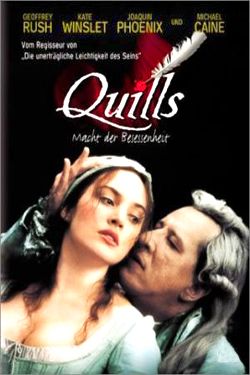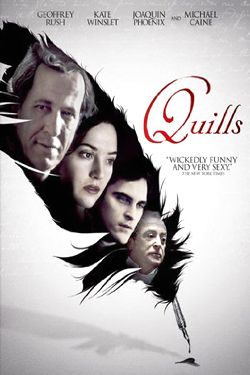Ok here you go Vicky, I think I've made you wait long enough. I would like to dedicate this review to Miss Vicky, not just for watching Lars and the Real Girl as part of our agreement, for becoming one of my most recent friends and supporters on here.  Hope you enjoy the review Vicky, sorry the score wasn't higher for you. Had I been in a generous mood it could perhaps have snuck a 4 -
Hope you enjoy the review Vicky, sorry the score wasn't higher for you. Had I been in a generous mood it could perhaps have snuck a 4 -
Oh and I was going to include my Boondock Saints review at the bottom but decided to leave it for now and allow Quills to stand on its own
Year of release
2000
Directed by
Philip Kaufman
Written by
Doug Wright
Starring
Geoffrey Rush
Joaquin Phoenix
Kate Winslet
Michael Caine
Amelia Warner
Billie Whitelaw
Quills
Plot - In 18th century France the Marquis de Sade (Rush), a writer of notoriously sadistic and depraved work, is imprisoned at Charenton Insane Asylum; not because of any questions over his sanity, but because of how those in power perceive his work to be dangerous. The asylum is run by Abbe de Coulmier (Phoenix), an idealistic young priest who perhaps surprisingly forms a friendship of sorts with the Marquis. The Marquis also forms one other relationship at Charenton; a flirtatious business arrangement with beautiful laundress Madeline (Winslet). Along with her help, the Marquis is still able to secretly publish his books, much to the anger of Napoleon. At his behest a new man is put in place to oversee events at Charenton. That individual is Dr. Royer-Collard (Caine), a man famed for his cruel and tortorous methods when it comes to dealing with the mentally challenged. With these two men out to destroy each other the whole of Charenton and all of its inhabitants are put at risk.
“Be forewarned, its plot is blood-soaked, its characters depraved, and its themes... unwholesome at best. But in order to know virtue, we must acquaint ourselves with vice. Only then can we know the full measure of man.”
That quote is a foreward from the Marquis de Sade for a novel penned by a charater he influences, however it works just as well for a description of this film. In terms of the issues at its heart this is nothing spectacularly new. Like so many others, Quills is a film about love, sex, lust and passion. But one that is just about as far removed from Hollywood's standard depiction as you could possibly imagine. The principle the film appears to be pushing is that all men are perverts and all women are lustful. All of the characters seem to be driven by secret and forbidden desires; whether it be for a girl young enough to be your granddaughter, a mental patient deemed perverse and amoral by society or for any kind of love whatsoever when you are in the priesthood. It's a film which resides very much in the grey areas of life, not surprising given that the film casts a notorious pervert and sadist as its sympathetic protagonist. Although I wouldn't say that the film is overly preachy with its views on morality. A large part of the film is about the influence that popular culture can have on society. While in the case of Quills it is the Marquis' books and plays it is an issue that still survives to this day, whether it be with films, video games or music. And there is one character in the film, a fellow inmate of the Marquis named Bouchon, who we do see being influenced by the Marquis' works. A mentally challenged individual, we see him re-enacting the depraved acts that he hears about from the Marquis himself. I suppose it's up to the viewer how they interpret this; is it an admission on the film's behalf that yes people can be influenced negatively by the work of other people, or given the character's mental deficiencies is it a commentary on how only the most simple-minded of people could be influenced by such work. Does Bouchon become depraved because of the Marquis' words, or was he always depraved and the words just gave him a direction to aim those depravities?
Quills is less about the Marquis and his work, and more about what his work represents. It's very much a film about the power and freedom of art and expression. As controversial and despised as they may be by some, the Marquis' writings speak to a great number of people and awaken desires within them that they perhaps didn't realise they even had. They are also the Marquis' salvation, the film depicts a character who 'had' to write; it was a compulsion for him and when it was taken away from him it drove him insane. Even locked away in this grim seclusion his writing gave him a sense of peace and of freedom. In this aspect Quills reminds me of the moment in The Shawshank Redemption where Andy Dufrense plays a Mozart record over the prison's tannoy system. He knows he will get into a substantial amount of trouble for it but he doesn't care, for one moment it has allowed him to feel human; just in general in fact it has just allowed him to feel, period. The Marquis' work also allows the film to explore censorship. So often over the centuries people in power have sought to control the distribution of art, particularly that which they feel undermines their position. In the case of Quills that occurs in the form of Napoleon and later, Dr. Royer-Collard. And given the doctor's behaviour it also shows us the hypocritical nature that can frequently be found in such individuals. So often the people who attempt to lay down the rules about acceptable behaviour are those that most often break it; whether it be gay-bashing politicians who themselves have homosexual dalliances, priests who speak of acting in line with God's wishes while molesting young boys etc. So here we see that in addition to procuring an under-age wife, Michael Caine's doctor is much more sadistic than the man he is treating; while the Marquis merely writes of vile acts the doctor employs brutal and barbaric methods as a means of 'curing' his patients. While the initially kind Abbe both lusts for Kate Winslet's virginal laundress, and betrays the friendship of sorts that he has built up with the Marquis by relenting to the doctor's demands for harsher and harsher treatments.
Quills also put itself in place to provide a commentary on the subject of mental health and the treatment of it. It obviously shows the dark, medieval conditions and attitudes of the time but sadly even today it could still work given the stigma that still exists for many people who suffer from mental health problems. And in the form of the Marquis it allows for a second comparison to The Shawshank Redemption. In Shawshank, Tim Robbins' character of Andy Dufrense remarks how he had to go to prison in order to become a criminal. And it's a similar case for Rush's Marquis who was placed in Charenton despite being completely sane. As his level of desperation escalates however, to the point where he uses his own blood and faeces as makeshift ink, one thing becomes clear - He had to go to a mental institution to become insane. It wasn't until his freedom of expression was taken away and he was subjected to Collard's cruel practices that his mind began to deteriorate.
Film Trivia Snippets - Before Philip Kaufmann took his place upon the directors chair Paul Verhoeven was a potential candidate to direct. /// For the role of Abbe de Coulmier, Hugh Jackman was a strong contender before it eventually went to Joaquin Phoenix, Kate Winslet's preferred choice. Other actors considered included Jude Law, Guy Pearce and Billy Crudup. /// The opening sequence sees an aristocratic woman being executed by the guillotine. She is not the only victim though, we see that the basket below her is already filled with numerous other decapitated heads. One of these heads is actually the genuine model cast from the real Marie Antoinette, on loan from Madame Tussaud's wax museum in London. /// Not a single line of dialogue from the original script was wasted. Every line that was cut from the script still made it into the film as part of the de Sade's scribblings, either written on his clothing, his bed sheets or on the walls of his prison cell. /// One scene in the film features the inmates of Charenton putting on a play written and directed by Rush's Marquis. That scene actually was directed by Geoffrey Rush. /// Joaquin Phoenix's beliefs meant that some special arrangements had to be made for his wardrobe. As a strict vegan he refused to wear leather, meaning that special plastic/pleather shoes had to be made for him. /// The role of the Marquis' wife, Renee Pelagie, was played by Jane Menelaus, who just happens to be Geoffrey Rush's real-life wife.
Given its theatre roots it will probably come as no surprise that a great deal of emphasis is placed on the characters and the actors who inhabit them. And thankfully the film was able to assemble a cast capable of living up to it. I thought that Geoffrey Rush, in an Oscar nominated performance, was really quite terrific as the Marquis de Sade. It is a bold and uncompromising turn which shows the numerous facets of his character. Most film fans will likely know Rush from the Pirates of the Caribbean film series where he starred opposite Johnny Depp's Jack Sparrow. And in an odd way there is actually something of the Jack Sparrow about Rush's Marquis. He's a very flamboyant, larger-than-life individual who has the real feel of a degenerate rock star. Had he been around a couple of hundred years later I wouldn't have been surprised to see the character up on the stage alongside the likes of Black Sabbath instead of writing such scandalous prose. Even in the scenes where the Marquis has been stripped bare and he stands before us completely naked, Rush still displays not a hint of humility, continuing to exude a great confidence and an in-your-face stubbornness and conviction about who he is and his artistic inclinations.
His may be the star turn but he is supported strongly by the rest of the cast. Joaquin Phoenix is excellent as the conflicted administrator of Charenton, Abbé de Coulmier. A man who enjoys the company of the Marquis as a friend, but is offended by the Marquis' work and the views he expresses towards his religion and his God; and a man who is strongly drawn towards Kate Winslet's Madeline but would have to break his vows to have anything come of it. Phoenix detailed the character's journey from innocent man of God and optimist into the depraved territory inhabited by the Marquis tremendously. Now I have to admit to not really being a fan of Michael Caine but I suppose that didn't hurt all that much given how much hatred we are meant to have for his character, Dr. Royer-Collard. And to be fair to Caine I thought it was quite a strong showing from him. Kate Winslet I thought did very well considering the character she was given to work with. I felt that her Madeline was the weakest in that respect, often coming across simply as a plot device to spark conflict between the male trio of the Marquis, Abbe and Royer-Collard. I didn't get a real sense of why she was so taken with the Marquis and his work. These are all highly experienced and highly regarded individuals though so they didn't come as much of a surprise really. The real find in that respect was Amelia Warner as Simone, the young child bride of Dr. Royer-Collard. When we initially meet her she seems like the most innocent and pure individual ever to grace the Earth. Before long however we discover she is an exceedingly sensual, amorous young thing who finds a release in the writings of the Marquis and subsequently embarks on an affair with the architect who is constructing their new home. She convinces the architect to whisk her away from the clutches of Royer-Collard, leaving him red-faced and furious. It's just a shame that the film completely forgets about her character at this point. The kind of possessive man that Collard is I would have expected him to do something to try and track her down. Anyway it is a character and a transformation that Warner portrays very well.
Film Trivia - There's no doubt that when it comes to 'based on a true story' films, there are very few which are more factually inaccurate than Quills. Yes the Marquis was placed in Charenton but that's about where the similarities end. In real life the Marquis wasn't alone at Charenton, living with his second wife (Marie-Constance Quesnet) and their daughter. He was actually sleeping with Madeline, who unlike Kate Winslet in the film was only 13 years old. And the inaccuracies become even more glaring where it concerns the characters. For example in real life the Abbe de Coulmier was a 60-year-old 4 foot tall hunchback. So by casting the then 24-year-old Joaquin Phoenix, someone who frequently pops up on sexiest man alive lists, constitutes a considerable upgrade in the looks department. And it was a similar case with Geoffrey Rush in the role of the Marquis. In reality the Marquis at this stage was an extremely obese individual. To be fair to the filmmakers though they are up front about these facts, saying that they were not making a biopic of the Marquis, but instead using his character to explore issues such as censorship, pornography, sex, art, mental illness and religion.
I felt that Quills was quite the treat to behold, a really grand and sumptuous slice of period drama with a lot of impressive work done on the artistic side of things. Alongside Geoffrey Rush's nomination for Best Actor, Quills received a further two nominations at the Academy Awards. Unsurprisingly they came in the categories of Art Direction and Costume Design. The design of the mental institution Charenton itself is fantastic; creating a really foreboding, oppressive setting for the story to unfold in. Even watching the film in my nice cosy home I could almost smell the dank, stale mustiness of its corridors and feel the shivers down my spine from its numerous drafts. In amongst this grim existence however you have the contrast of the palatial sanctuary that is the Maquis' private cell; extravagantly adorned with a luxurious four poster bed, lavish furniture (including an antique writing desk), stacks upon stacks of books, numerous paintings and sculptures (largely of a sexual nature), quills as far as the eye can see and an ample supply of wine. Oh and the costume design throughout is excellent, whether it be the tattered rags worn by Winslet and her fellow workers at Charenton or the luxurious clothes worn by the upper classes.
The screenplay for Quills was written by Doug Wright in an adaptation of his own play. Quite often when a film has been adapted from a play it can struggle to break away from feeling stiff and stagey. And while there is no doubting its theatrical roots when it comes to its witty wordplay and fun turns of phrase, it avoids feeling dry or stuffy thanks to the energy both of its cast and the playful direction of Philip Kaufman. Whether it be the lively opening that juxtaposes an execution alongside the Marquis' writings, or a delightful little shot that focuses on the dangling legs of the notoriously vertically challenged Napoleon, he makes sure to keep a strong vein of dark humour running through it.
I think the film's best scene, and certainly my personal favourite, was the theatre scene which depicted the performance of “The Crimes of Love”, a scandalous play written by the Marquis and inspired by the ruthless gossip surrounding Royer-Collard's marriage to the young Simone. As well as being quite simply an immensely entertaining sequence, it shows off pretty much every one of the film's great attributes. You've got impressive work in the departments of directing, set design, costumes etc and all of the actors get the chance to provide a little showcase of their talents. You've got Rush positively bursting with glee at what he has accomplished in shaming Royer-Collard; I think he sports the biggest grin seen on film since the Cheshire Cat in Alice in Wonderland. Meanwhile you have Caine and Phoenix side-by-side, both slowly coming to the realisation of what it is they are seeing. Phoenix squirming in his seat with growing discomfort and Caine's increasing rage make for a very uncomfortable, tense atmosphere. It was also the best example of the dark, crude humour sparked by the Marquis' work in the film. I have no real interest in reading the Marquis' work myself, however when his words are being delivered with such relish by the cast it was extremely entertaining. I don't think I've heard so many euphemisms, particularly for genitalia, since my days on the school playground. And I plan on attempting to reintroduce many of these words into general usage. 
Conclusion - If I'm being honest I was more curious about watching Quills, than truly wanting to see it. It didn't sound like a whole lot of fun and I half expected that I would be quite turned off by its subject matter. However I have to say that I enjoyed it a good deal more than I imagined I would. It's a strongly written, supremely well acted film which is backed up by some really impressive production values. I also found it to be a good deal funnier than I was expecting, largely due to Rush's excellent showing as the Marquis. While I did enjoy it to a somewhat surprising degree I still don't think it could ever become a personal favourite that I'd want to rewatch again all that often. I'd say I probably admire its quality more than I actually liked it. Though who knows, maybe I'll grow to love it just like you do Vicky.


 Typical Hollywood bastardisation of the facts. They may as well have just set it in the present day for the amount of sh*t they pull.
Typical Hollywood bastardisation of the facts. They may as well have just set it in the present day for the amount of sh*t they pull. Typical Hollywood bastardisation of the facts. They may as well have just set it in the present day for the amount of sh*t they pull.
Typical Hollywood bastardisation of the facts. They may as well have just set it in the present day for the amount of sh*t they pull. You get the real review tomorrow.
You get the real review tomorrow.  You get the real review tomorrow.
You get the real review tomorrow. 
 Hope you enjoy the review Vicky, sorry the score wasn't higher for you. Had I been in a generous mood it could perhaps have snuck a 4 -
Hope you enjoy the review Vicky, sorry the score wasn't higher for you. Had I been in a generous mood it could perhaps have snuck a 4 -
 Are you an F1 fan? Oh and by the way am I getting mixed up or when someone else mentioned/reviewed Rush did you mention how you watched a documentary about their rivarly or something?
Are you an F1 fan? Oh and by the way am I getting mixed up or when someone else mentioned/reviewed Rush did you mention how you watched a documentary about their rivarly or something?
